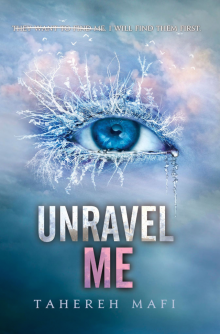- Home
- Tahereh Mafi
This Woven Kingdom Page 11
This Woven Kingdom Read online
Page 11
There’d been so little time to flee.
They’d come in the night, when Alizeh and her sole surviving parent had been abed. The two tried, of course, to escape, but a wooden rafter had fallen from the ceiling, pinning them both to the ground. Had it not been for the blow she’d taken to the head, her mother might’ve been strong enough to lift the beam from their bodies that night.
For hours, Alizeh screamed.
For what felt like an eternity, she screamed. And yet, their home had been so expertly hidden away that there was no one to hear the sound. Alizeh clung to her mother’s body as it burned, taking the embroidered handkerchief from her parent’s limp hand and gathering it up in her own fist.
Alizeh had remained with her dead mother until daylight. If not for the eventual disintegration of the beam that trapped her body, Alizeh would’ve stayed there forever, would’ve died of dehydration alongside her mother’s charred flesh. Instead, she emerged from the inferno without a scratch, her skin pristine, her clothes in tatters, the handkerchief all she’d possessed intact.
It was the second time in her life she’d survived a fire unscathed, and Alizeh had wondered then, as she often did, whether the ice that ran through her veins would ever truly matter.
She startled, suddenly, at the rattle of the back door.
Alizeh dared not breathe as she got to her feet. She pressed herself against the wall, tried to calm her racing heart. Her mind knew she had little reason to be afraid here, within the protection of this grand home, but her frayed nerves could not comprehend such logic. Upon entering Baz House she’d been single-minded in her haste to reach the fire; in the process she’d forgotten to lock the kitchen door.
She wondered whether to risk doing so now.
In a split second, Alizeh made the decision. She flew to the door and threw the bolt just as the handle began to turn, and when the mechanical movement came to a sudden halt, she sagged with relief. She fell back against the door, clasping both hands to her chest.
She could hardly catch her breath.
The knock that came next was so unexpected she jumped a foot in the air. She looked around for signs of servants lurking, but none appeared. One glance at the clock and she was reminded: anyone with sense was now abed. She alone was left to manage the destitute stragglers no doubt seeking shelter from the rain. It broke Alizeh’s heart to deny them relief from the desperation she understood only too well, but she also knew she had no choice—not unless she wanted to be tossed into the street alongside them.
The knock came again, and this time she felt it, felt the door shake with it. She pressed her back harder against the wood, keeping it from moving in its frame. There was a brief reprieve.
Then: “I beg your pardon, but is someone there? I have a rather urgent delivery.”
Alizeh went deathly still.
She recognized his voice right away; indeed, she doubted she’d ever forget it. He’d discomposed her with a few gentle words, had stripped her of all composure with mere syllables. Even then she’d recognized the strangeness of her reaction—she did not think it common to be so moved by the sound of a voice—but his was rich and melodic, and when he spoke she seemed to feel it inside her.
Another knock. “Hello?”
She steadied herself and said, “Sir, you may leave any deliveries at the door.”
There was a beat of silence.
The prince’s voice seemed changed when he next spoke. Softer. “I pray you will forgive me that I cannot, miss. These packages are very important, and I fear they’ll be destroyed in the rain.”
For a moment, Alizeh wondered whether this wasn’t a cruel trick; no doubt he’d come to arrest her for vanishing illegally into the night. There seemed no other plausible explanation.
Certainly the prince of Ardunia had not braved a torrential downpour to personally deliver a stock of trivial goods to the lowly servant residing at Baz House? And at this late hour?
No, she could not believe it.
“Please, miss.” His voice again. “I should only like to return the parcels to their owner.”
Alizeh felt suddenly awake with fear. She supposed a different person might be flattered by such attentions, but Alizeh could not help but be wary, for not only did she doubt his motives, but she couldn’t imagine how he’d known to find her when she’d said but a few words in his presence.
She swallowed, squeezing her eyes shut.
Then again, what did any of it matter if there was a chance she might be returned her parcels? To Alizeh, those packages were everything; without them, her immediate future appeared nothing short of disastrous. If the prince had come all this way only to torture her, she couldn’t see what he might gain by it, for she was perfectly capable of defending herself.
No, what confounded her above all else was why the devil had shown her this young man’s face.
Perhaps tonight she would finally know.
Alizeh took a deep breath and turned the lock.
The door groaned as it opened, bringing with it a shower of windswept rain. She quickly stepped aside, allowing the prince entrée, for he was, as she suspected, soaked to the bone. His arms were crossed tightly against his chest, his face obscured almost entirely by the hood of his cloak.
He closed the kitchen door behind him.
Alizeh took several steps back. She felt horribly exposed meeting him like this, without her snoda. She knew there was little to hide, not now that he’d already seen her face in full, had borne witness to her strange eyes.
Still. Habit was hard to overcome.
Wordlessly, the prince unhooked the satchel from his body and held it out to her. “The packages are within. I trust they’re all accounted for.”
Alizeh’s hands were shaking.
Had he really come all this way only to deliver her a kindness?
She tried to affect calm as she opened the bag and was uncertain of her success. One at a time, she withdrew the packages, balancing them carefully in the crook of her arm. They were all there, only slightly worse for wear.
Alizeh couldn’t quell the sigh of relief that escaped her then. Fresh tears pricked her eyes and she blinked them away, composing herself as she returned the bag to its owner.
The prince froze as he accepted the satchel.
He appeared to be staring at her, but with much of his face so hidden from view, Alizeh couldn’t be sure.
“Your eyes,” he said quietly. “They just”—he shook his head an inch, as if to clear it—“I could’ve sworn they just changed color.”
Alizeh retreated farther, putting several pieces of furniture between them. Her thudding heart would not slow. “Please accept my sincerest gratitude,” she said. “You’ve rendered me an unaccountable service by returning my packages. Truly, I do not know how to thank you. I am in your debt, sir.”
She winced.
She should have said sire, should she not?
Thankfully, the prince in question did not seem to take offense. Instead, he pulled back his hood, revealing his face in full for the first time. Alizeh took a sharp breath and a step back, catching herself against a chair.
It was mortifying, truly, that she could not bear to look at him.
She’d seen his face in her nightmare, but rendered in real life the effect was entirely different; he was startling to behold in the flesh, the sharp planes of his face illuminated by firelight. He had piercing eyes the color of coal, his olive skin so golden it seemed to glow. Indeed there was something almost unnaturally illuminated about him—as if he was limned with light around the edges—and she could not pinpoint its origin.
He took a step toward her.
“First they were blue,” he said softly. “Then brown. Silver. Ah. Now they’re brown again.”
She stiffened.
“Blue.”
“Stop, I beg you.”
He smiled. “I see now why you never remove your snoda.”
Alizeh lowered her eyes and said, “You cannot know
that I never remove my snoda.”
“No,” he said, and she heard the humor in his voice. “I daresay you’re right.”
“I must bid you good night,” she said, and turned to go.
“Wait. Please.”
Alizeh froze, her body turned toward the exit. She wanted desperately to take her parcels up to her room, where she might reapply the miraculous salves to her injuries. Pain was lancing across her palms, her throat.
She held the back of her hand to her forehead.
That she was warm at all meant she was warmer than usual, though she consoled herself with the knowledge that there might, at the moment, be several reasons for her elevated temperature.
Slowly she turned around, locking eyes with the prince.
“You must forgive my inability to grant you an audience at this hour,” she said quietly. “I’ve no doubt you are generous enough to comprehend the difficulty of my position. I’ve precious few hours to sleep before the work bell tolls, and I must return to my quarters with all possible haste.”
The prince seemed taken aback by this, and indeed took a step back. “Of course,” he said softly. “Forgive me.”
“There is nothing to forgive.” She bobbed a neat curtsy.
“Yes.” He blinked. “Good night.”
Alizeh turned the corner and waited in the dark, her heart racing, for the sound of the back door opening, then closing. When she was certain the prince was gone, she returned quietly to the kitchen to lock up and bank the fire.
Only then did she realize she was not alone.
Fourteen
SLEEP, THAT ELUSIVE FIEND, CAME so unwillingly to the prince that it refused to remain long. Kamran awoke before dawn with a sharpness that surprised him, for he was both abed and then out of it before the sun had even met the horizon. His body was fatigued, yes, but his mind was clear. It had been running all night; his dreams fevered, his imaginings frenzied.
He’d begun to wonder whether the girl had cursed him.
She clearly knew not what she’d done to him, nor could she be blamed for her success in so thoroughly disordering his faculties, but Kamran could not conceive a more elegant explanation for what had overcome him. He was moved neither by a base need to physically possess the girl, nor was he deluded enough to think he might be in love with her. Still, he could not understand himself. Never before had he been so consumed by thoughts of anyone.
The girl was going to be murdered.
She was going to be murdered by his own grandfather, and it seemed to Kamran the worst kind of tragedy.
The prince was one of the few people who knew, of course. He and Hazan both knew of the prophecy, the foretelling of a creature with ice in its veins. Every king in the history of the Ardunian empire had received a prophecy, and King Zaal had felt it his duty to manage the prince’s expectations of such an event. Long ago his grandfather had explained to him that, on the day of his coronation, Kamran would receive two visits.
The first, from a Diviner.
The other, from the devil.
The devil would offer him a bargain, the terms of which Kamran should under no circumstances accept. The Diviner, his grandfather had said, would make a prediction.
When Kamran asked what prediction the Diviners had made for him, King Zaal had grown unnaturally reticent, saying only that he’d been warned of the rise of a fearsome adversary, a demon-like creature with ice in its veins. It was said to be an enemy with allies so formidable its mere existence would lead to the king’s eventual demise.
Enraged, the young prince had promised his grandfather right then that he would search all of Ardunia for this monster, that he would slay the beast and deliver its head to the king on a pike.
You need not worry, his grandfather had said, smiling. I will slay the beast myself.
Kamran closed his eyes and sighed.
He splashed water on his face, performing his morning ablutions with care. It seemed impossible that the terrifying monster of his childhood imaginings was in fact the stunning young woman he’d encountered last night.
Kamran towel dried his face and applied orange blossom oil to his neck, to the pulse points at his wrists. He took a deep breath and drew the intoxicating scent into his body, relaxing as it warmed his chest, lowered his heart rate.
Slowly, he exhaled.
He was so unfamiliar with the feelings that possessed him now that he wondered for a moment whether he might well and truly be ill. How he’d even delivered himself to his chambers the evening prior he knew not, for he rode home through the blustery night as if in a trance. The girl’s beauty had first rendered him speechless under the most unflattering conditions—in the half-light of a vicious storm—but seeing her face by firelight had dealt him a physical blow from which he had no hope of recovering.
Worse, far worse: he thought her fascinating.
He found himself captivated by her contradictions, the choices she made, even the way she moved.
Who was she, precisely? Where had she come from?
His ambitions upon arriving at her door last night had been scattered by a battering of his senses. He’d hoped to accomplish a great deal by going to her; he’d wanted to return her packages, yes, but there was something more that had compelled his senseless visit, a motivation of which he was entirely ashamed. Had his visit been successful Kamran might’ve betrayed his king, his empire. He would’ve been reduced to the most repellant variety of idiot, instead of the next king of Ardunia.
He’d gone to warn her.
He’d gone to tell her to run, to pack her bags and flee, to find a safe place to hide and remain there, possibly forever. And yet, when he saw her face, he realized that he could not simply ask her to run; no, she was an intelligent girl, she would have questions. If he told her to flee, she would want to know why. And what reason would she have to trust him?
He’d hardly begun to process this when she’d all but dismissed him.
It was possible she’d not known who he was—she’d called him sir, at one point—but he suspected that even if she’d known she were speaking to a prince she’d have treated him the same.
In any case, it did not seem to matter.
Kamran had known his grandfather’s position on the girl; going against the king would’ve been an act of treason. Had Kamran been found out, his head would’ve been removed from his body in short order. It was some small miracle, then, that he’d lost his nerve.
Or perhaps regained his good sense.
He did not know this girl. He did not understand why the thought of killing her left him feeling ill. He only knew that he had to at least try to find another way—for surely she, a humble servant, was not the demon-like creature with an abundance of formidable allies prophesied all those years ago.
No, most assuredly not.
Kamran finished dressing himself without the assistance of his still-sleeping valet, and then—to the shock and horror of the palace servants—stole belowstairs to filch a cup of tea from the kitchens on his way out.
He needed to speak with his grandfather.
Kamran had lived at the royal palace his whole life and yet he never tired of its resplendent views, its acres of manicured gardens, its endless pomegranate groves. The grounds were of course always magnificent, but the prince never loved them more than he did at sunrise, when the world was still quiet. He stopped where he stood then, lifting the still-steaming cup to his lips.
He was standing in the illusion of a glittering infinity; the single mile of ground beneath his feet was in fact a shallow pool three inches deep. A sudden wind nudged water against his boots, the soothing sounds of gentle waves a welcome balm for his tired mind.
Kamran took another drink of his tea.
He was staring up at the soaring, open-air archways, their tens of dozens of exquisite columns planted into the shallow depths around him. The smooth white stonework of the structures was inlaid with vibrant jewels and vivid tiles, all of which benefited now from the bloss
om of a waking sun. Fiery light refracted against the bezel-set gems, fracturing endless prismatic colors along the sleeping grounds. More golden rays shattered through the open arches, gilding the water beneath his feet so that it looked almost like liquid bullion.
The beauty of Kamran’s life was often lost on him, but not always. There was some mercy in that.
He finished the last of his tea and hooked a finger through its glass handle, letting the cup swing as he strode onward. With the rise of the sun came the stir of servants; snodas were popping up all around him, bustling past with vessels and trays.
Baskets of pomegranates were balanced precariously on heads, under arms. There were silver trays heaving with baklava and delicate honey grapes, others stacked high with fresh barbari bread, each oblong sheet the length of a setar. And flowers—manifold bouquets of flowers—tens of servants rushing by carrying armloads of the fragrant stems. There were copper bowls filled with glossy green tea leaves; basil and mint and tarragon piled high on gold platters. Another endless procession of snodas carried rice—innumerable, incalculable sacks of rice.
Sudden foreboding caught Kamran by the throat; he went unearthly still.
Then he spun around.
There was more; there were more. More servants, more trays, more baskets and tureens and bushels and platters. Wheels of feta cheese were shuttled past; trolleys overstuffed with fresh chestnuts. There were stockpiles of vivid-green pistachios and salvers laden with saffron and tangerines. There were towers of peaches; an abundance of plums. Three servants shuffled past with a tremendous dripping honeycomb, the mass of sticky beeswax spanning the width of an oversized door.
Every second seemed to bring more.
More crates, more hampers, more sacks and wheelbarrows. Dozens and dozens of servants rushing to and fro.
It was madness.
While it was true that there was often a great deal happening at the palace, this level of activity was unusual. To see the servants getting started so early—and with so much to occupy their arms—

 Shatter Me
Shatter Me Restore Me
Restore Me Destroy Me
Destroy Me Unravel Me
Unravel Me Ignite Me
Ignite Me Defy Me
Defy Me Fracture Me
Fracture Me Shadow Me
Shadow Me Whichwood
Whichwood Reveal Me
Reveal Me Furthermore
Furthermore Shadow Me (Shatter Me Novella)
Shadow Me (Shatter Me Novella) Believe Me
Believe Me Restore Me (Shatter Me)
Restore Me (Shatter Me) Imagine Me
Imagine Me An Emotion of Great Delight
An Emotion of Great Delight Find Me
Find Me A Very Large Expanse of Sea
A Very Large Expanse of Sea Unravel Me: The Juliette Chronicles Book 2
Unravel Me: The Juliette Chronicles Book 2